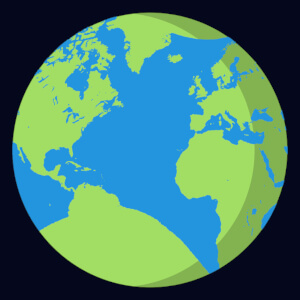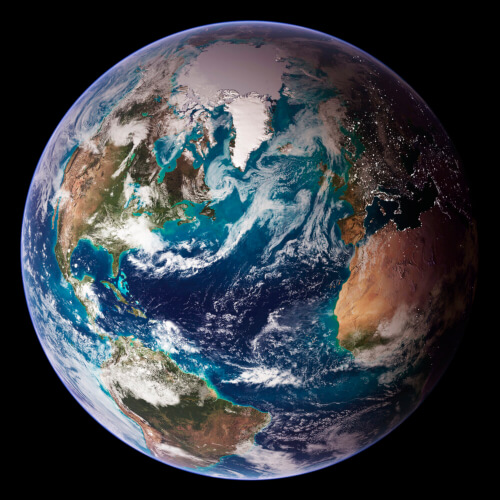



Earth is the third planet from the Sun in the solar system and the only planet or object in the universe known to harbor life. Scientists estimate that the Earth formed about 4.54 billion years ago, about 60 million years after the Sun.
| Type of Planet | Terrestrial |
|---|---|
| Moons | The Moon |
| Rings | None |
| Mass | 5.972 × 1024 kg |
| Volume | 1,083,000,000,000 km3 |
| Closest Distance to Sun | 147,100,000 km |
| Furthest Distance from Sun | 152,100,000 km |
| Average Orbital Speed | 107,200 kph |
Earth is an extraordinary planet because it's the only one in the known universe that supports life. Its remarkable qualities including its abundance of water, its climate, and its atmosphere create a habitat for countless living species.
The planet's diverse environments, such as forests, grasslands, deserts, mountains, and polar regions, support an incredible range of life forms. From microscopic bacteria to towering trees, from insects to apex predators, Earth's ecosystems are teeming with biodiversity. It's the interactions between all these different species that help keep everything in balance.
Liquid water is essential for life as we know it. This is because the chemical reactions necessary for living organisms to survive require water. Earth's surface is about 71% water, with vast oceans, lakes, rivers, and underground water sources. These bodies of water support a rich variety of aquatic life forms, ranging from microscopic organisms to massive marine mammals.
While there are differences in temperature across different regions and seasons, Earth's overall temperature range allows for the presence of liquid water. This enables the development of ecosystems that support a wide range of plants and animals. Earth's distance from the Sun plays a crucial role in maintaining these moderate temperatures, as it receives just the right amount of solar energy to sustain life.
Earth's atmosphere is composed of a mix of gases, mostly including nitrogen (N), oxygen (O2, carbon dioxide (CO2), as well as small amounts of other gases. This mixture not only provides the oxygen necessary for respiration but also helps regulate the planet's temperature. The atmosphere acts as a shield, protecting life on Earth from harmful radiation and even meteor impacts. It also plays a vital role in the water cycle, ensuring the availability of water for various ecosystems.
Humans have flourished on Earth, harnessing its resources and building civilizations. Our species has evolved to adapt to different environments, using our intelligence and creativity to shape the world around us. Throughout history, humans have developed sophisticated technologies and cultural systems, shaping the course of life on Earth.
However, the delicate balance of Earth's ecosystems is currently under threat. Human activities, such as deforestation, pollution, and climate change, pose significant challenges to the planet's biodiversity and overall well-being. Recognizing the importance of preserving Earth's unique ability to sustain life, there is a growing global effort to promote sustainable practices, protect endangered species, and mitigate the impacts of human activities on the environment.
When Earth was formed over 4.5 billion years ago, a day was only around six hours long! As years and years went by, forces between the Earth and the Moon have caused its rotation to slow, ever so slightly—only a millisecond or two every century. This change is so small you'll never notice it in your lifetime.
It's not a coincidence that the continents almost seem to fit together like the pieces of a jigsaw puzzle. Pangea, a supercontinent where all of today's Earth's continents were combined into one, was formed about 335 million years ago and began to separate about 175 million years ago. It was centered near Earth's equator and surrounded by the superocean named Panthalassa, which occupied about 70% of Earth's surface.
By mass, Earth is made out of approximately 32.1% iron (Fe), 30.1% oxygen (O), 15.1% silicon (Si), and 13.9% magnesium (Mg). Sulfur (S), nickel (Ni), calcium (Ca), and aluminum (Al) are slightly less common, followed by every other element on the Periodic Table combined making up only 1.2% of the Earth by mass.
It really takes about 365.2422 (almost 365 and a quarter) days for the Earth to complete a full orbit around the Sun. Wait a minute—doesn't that mean that, every four years or so, we'll have an entire extra day? Yes! Every four years, we add an extra day to the calendar, February 29th, and the year becomes a leap year.
The Earth's true shape is what's known as an oblate spheroid, a kind of flattened sphere. Because of the force caused by Earth's rotation, the equator bulges slightly outward. In fact, if you were to travel around the equator, you'd be traveling about 43 km more than if you were to travel around the Earth from pole to pole.
This leads to the strange fact that, although Mount Everest is the tallest mountain on Earth, the point furthest away from Earth's center is actually Mount Chimborazo in Ecuador. Additionally, because the force of gravity is affected by your distance from the center of the Earth, you would weigh slightly less on the equator than at one of Earth's poles!
Though we don't think of it much, land only covers less than a third of Earth's surface. This is why Earth has the nickname the "Blue Planet." About 96.5% of this water is held by Earth's oceans.